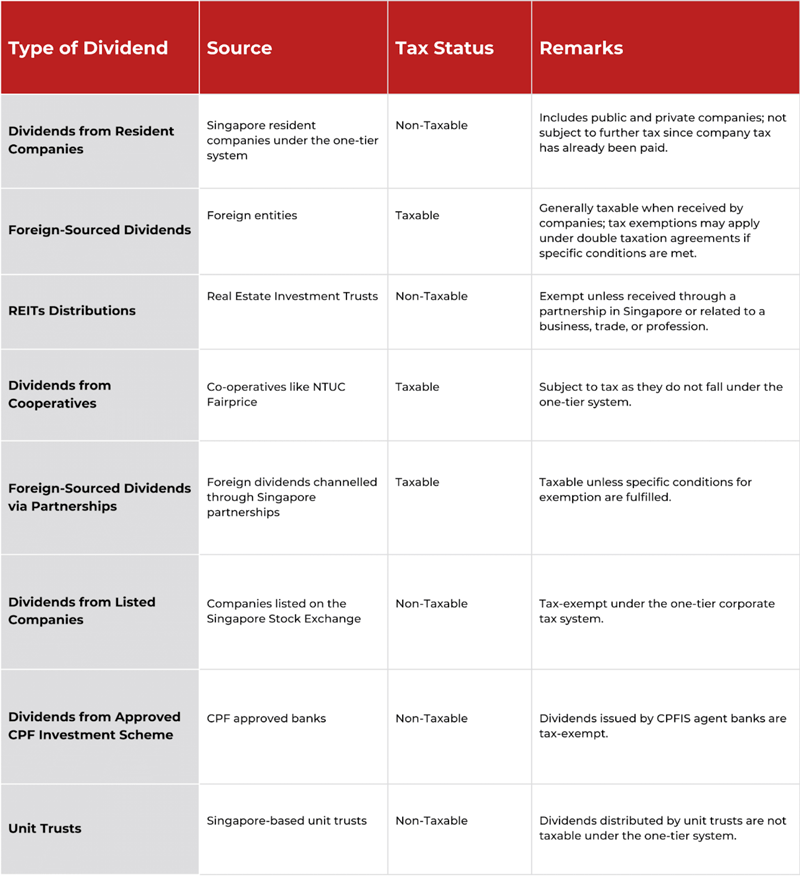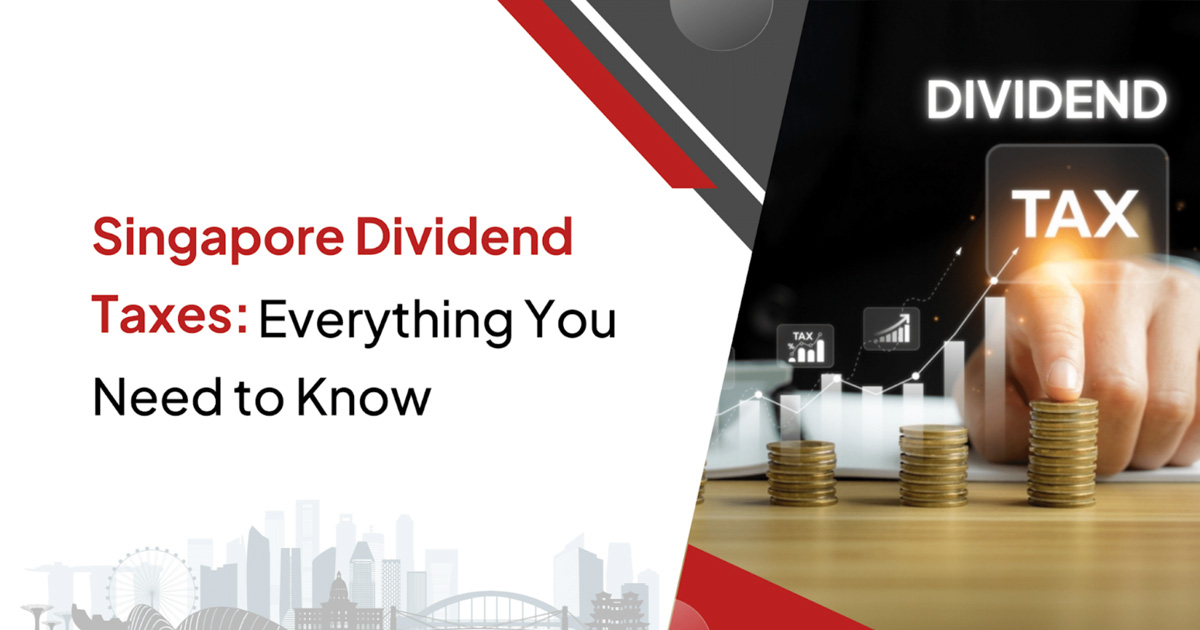Inside This Article:
Dividends are crucial in many investors’ financial portfolios in Singapore and the rest of the world. As a form of income derived from owning shares in a company, understanding the tax implications of dividends is essential for maximising financial returns and adhering to local tax regulations.
This guide will simplify the nuances of dividend taxation in Singapore, ensuring that both seasoned investors and newcomers can navigate these waters with clarity and confidence.
What Are Dividends?
Dividends are payments made by a company to its shareholders out of its profits. In Singapore, these can be distributed in two forms: cash or additional shares. Owning shares in a company entitles you to a portion of its profits distributed as dividends, reflecting your stake in the company.
Taxable vs Non-Taxable Dividends
Understanding which dividends are taxable and which are not is essential for effective tax planning. Here’s a simple breakdown:
Non-Taxable Dividends
- Dividends from Singapore Resident Companies: Under the one-tier corporate tax system, dividends issued by resident companies are not taxable. This includes dividends from public companies listed on the Singapore Stock Exchange and private resident companies.
- Foreign-Sourced Dividends: These are generally not taxable for resident individuals unless received through a partnership in Singapore.
- REITs Distributions: Income distributions from Real Estate Investment Trusts are non-taxable, except when received through a partnership or related to business activities within REITs.
Taxable Dividends
- From Co-operatives: Dividends from entities like NTUC Fairprice Co-operative are taxable.
- Foreign-Sourced Dividends Through Partnerships: These need to meet specific criteria to be non-taxable.
- REITs Income for Business Purposes: These are taxable if related to business activities.
Example Chart: Dividend Taxation Overview
This table offers a clear distinction between the types of dividends and their tax implications, helping individuals and companies in Singapore make informed investment decisions.

Reporting Dividend Income in Singapore
All dividends considered taxable income must be declared on your Income Tax Return under the ‘Other Income’ section. Companies often provide a dividend voucher that specifies whether the information will be directly furnished to the IRAS (Inland Revenue Authority of Singapore).
Dividends or Salary: What’s the Better Pay?
Choosing between dividends and salary for compensation depends on multiple factors like your financial situation and tax implications. While dividends are not taxed and do not count as a business expense, salaries are tax-deductible for the company but taxed at progressive rates on the individual.
Foreign-Sourced Dividend Taxation
Singapore’s approach to foreign-sourced dividends promotes fairness and prevents double taxation. If taxes have been paid in the originating country, Singapore will typically not levy additional taxes on these dividends, provided a double taxation agreement is in place. This ensures that dividends from international sources are treated equitably, making Singapore an attractive hub for global investments.
Income Tax Rates for Dividends in Singapore
Understanding the applicable tax rates is crucial for effective financial planning:
- Corporate Tax Rate: 17% for company profits.
- Dividend Payments: Dividends paid by Singapore companies to their shareholders are taxed at a 0% rate.
- Foreign-Sourced Dividends: If not reinvested in Singapore, these dividends are also subjected to a 0% tax rate.
- Taxation of Dividends Declared in Singapore: Dividends earned abroad and declared in Singapore are taxed at variable rates, from 0% to 17%, depending on certain conditions.
Issuing and Managing Dividends in Singapore
Issuance of Dividends
Before issuing dividends, a Singapore company’s directors must propose such a distribution to the shareholders, ensuring that the dividends are payable from the company’s profits. It’s essential that these profits are sufficient and derived solely from the company’s operations, even if part of a group. The declaration process involves several steps, including preparing financial statements and securing shareholder approval through the Annual General Meeting or resolutions for interim dividends.
Documentation and Compliance
Comprehensive documentation, such as the dividend register, resolutions, and meeting Minutes, must be meticulously prepared and maintained for dividends to be issued.
Rikvin, offers support in preparing these documents to ensure compliance with regulatory requirements and smooth dividend distribution.
Conclusion
At Rikvin, we simplify the complexities of dividend taxation in Singapore for our clients. We encourage you to enhance your understanding of dividend taxation with us and ensure that your investment decisions are both profitable and compliant.
FAQs on Singapore GST Rate Change
- In Singapore, there is no specific tax levied directly on dividends. However, the income from dividends is included in the total income for both companies and individuals. The tax rate for corporate income is consistently set at 17%. Individuals are taxed according to progressive rates depending on their total income level.
- For Singapore resident individuals, dividends are typically exempt from tax. For companies, certain conditions must be met for dividends to be considered tax-exempt.
- Shareholders of private limited companies in Singapore benefit from tax-exempt dividends, thanks to the one-tier corporate tax system, which eliminates double taxation.
- While individual shareholders do not need to report dividend income that is tax-exempt, all companies must include all sources of income, such as dividends, in their annual tax filings with the Inland Revenue Authority of Singapore (IRAS).
- When dividends are reinvested, they are considered as having been received by the recipient, whether an individual or a company. The usual tax rules apply to determine if these reinvested dividends are taxable.
Optimise Your Dividend Strategy Now!
Reach out to our experts for personalised guidance on Singapore's dividend taxes.

Mabel has over 20 years of direct and indirect tax experience covering Singapore and APAC regions. She provides advice to businesses on tax-related exposures such as permanent establishment issues, corporate tax, GST/VAT, and withholding tax obligations related to business proposals.


